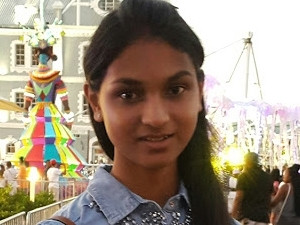
A 16-year-old South African has won the coveted Google Science Fair Community Impact Award, in the hotly-contested Africa and Middle East region.
Kiara Nirghin, from Johannesburg, is now in the running to become one of 16 global finalists, who will get to visit Google's headquarters in California in September, for the annual awards celebration.
The Google Science Fair invites the brightest young minds from around the world to answer one important question: how can they make the world better through science, math and engineering.
Nirghin submitted her 'No More Thirsty Crops' innovation. With the Southern African region experiencing its worst drought in more than two decades, she has come up with a revolutionary way of keeping crops hydrated for longer, at a much lower cost.
Using orange peels and avocado skins, the teen has managed to create a material that can hold hundreds of times its weight in water, in the soil. This super-absorbent polymer then acts as a water reservoir in the earth.
By saving water this way, her idea could have a massive impact on how the continent manages the effects of climate change in years to come. And, because it's made from orange and avocado skins, it won't break the budget of local farmers, like so many other water storage devices currently do.
Nirghin says science has been coursing through her veins since a very young age. "I vividly remember at the age of seven experimenting with vinegar and baking soda solutions in plastic cups. My natural curiosity and questioning nature has sparked my everlasting love of science," she says.
It's her love of chemistry and physics that has gotten her this far in the competition, with Google receiving thousands of entries from 107 countries.
Some ideas at the competition included a new take on solar and steam energy with a "periscope-derived" energy device in Kenya, and portable energy solutions to modernise rural communities in Cameroon.
Nirghin will find out on 11 August whether she has made it to the global final 16.
Share